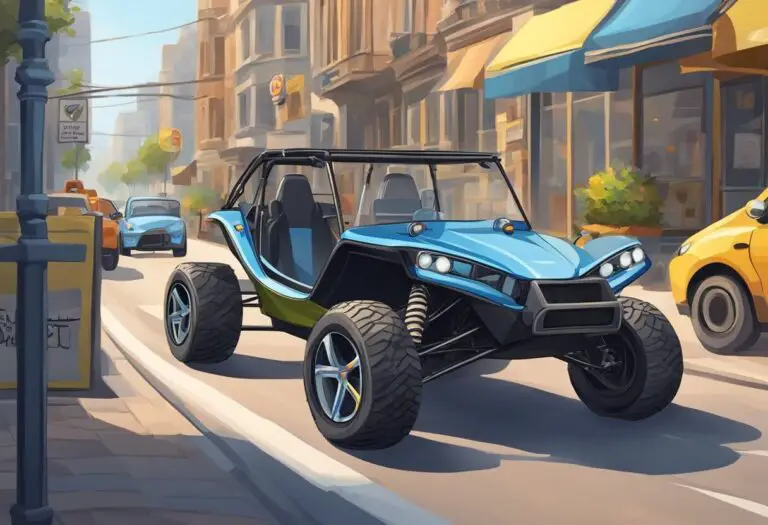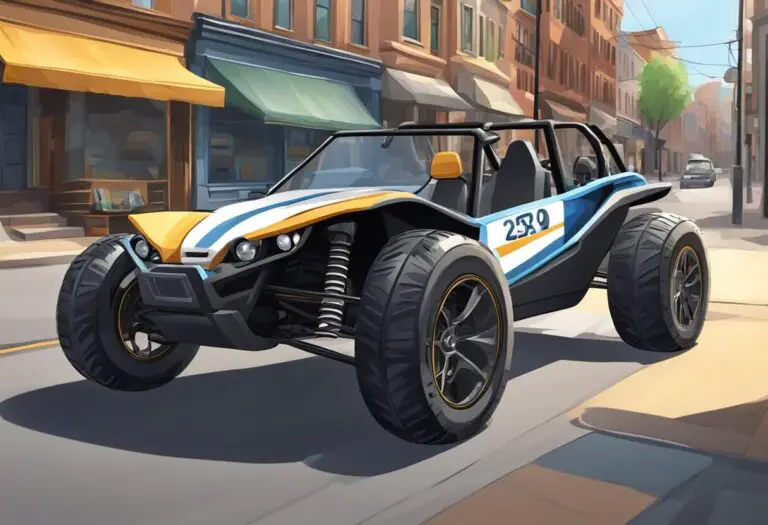Street Legal VW Dune Buggy: Everything You Need to Know
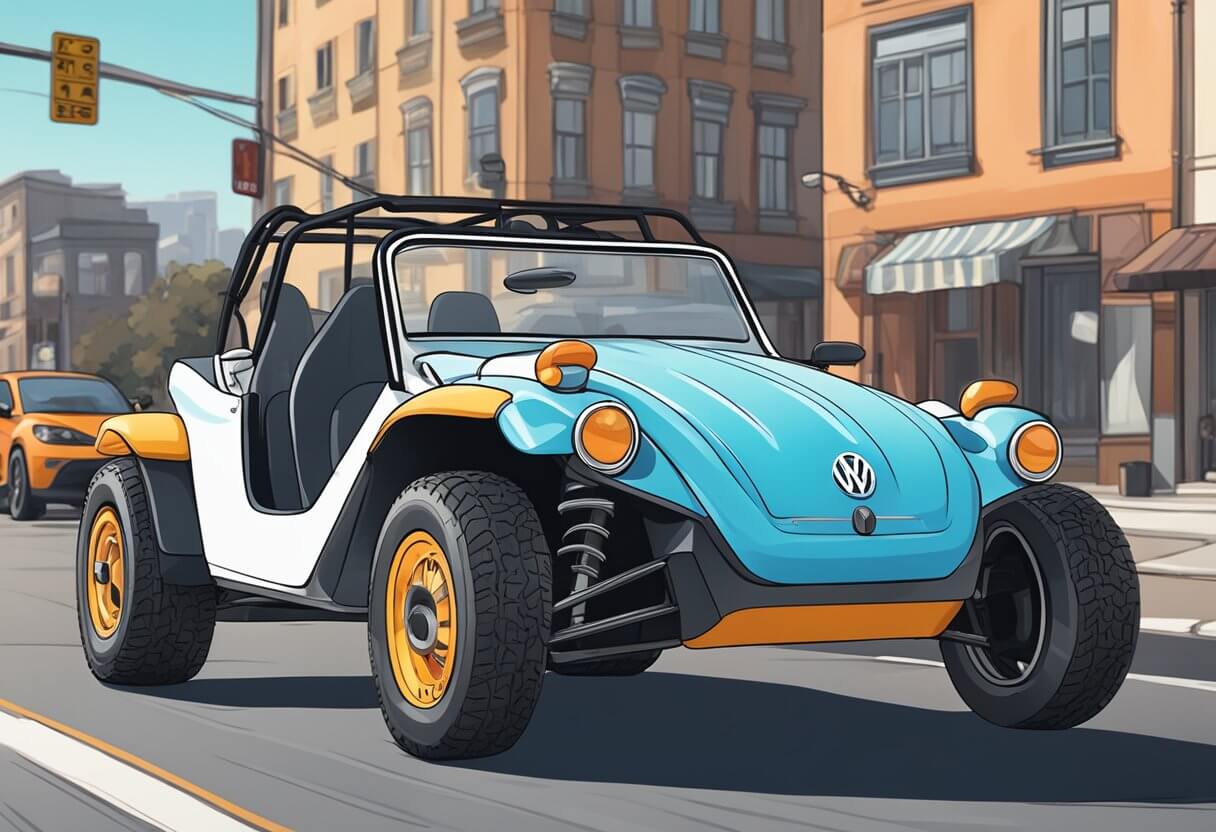
Street legal VW dune buggies have become increasingly popular among off-road enthusiasts who want to enjoy the thrill of driving a dune buggy on public roads. These vehicles are modified versions of the classic VW Beetle and are designed to meet the legal requirements for street use. While they are not as powerful as other off-road vehicles, they are lightweight and maneuverable, making them ideal for cruising around town or exploring the backcountry.
To legally drive a VW dune buggy on public roads, it must meet certain requirements. This includes having a valid license plate, registration, and insurance. In addition, the vehicle must comply with state and federal laws regarding emissions, safety, and noise. To ensure compliance, modifications may be required, such as adding turn signals, brake lights, and a rearview mirror.
While the process of converting a VW dune buggy into a street legal vehicle can be challenging, it is a rewarding experience that allows enthusiasts to enjoy the best of both worlds. By following the legal requirements and making the necessary modifications, drivers can enjoy the freedom of driving a dune buggy on public roads without fear of getting ticketed or impounded.
Key Takeaways
- Street legal VW dune buggies are popular among off-road enthusiasts who want to drive a dune buggy on public roads.
- To be street legal, a VW dune buggy must meet certain legal requirements and modifications may be necessary.
- Converting a VW dune buggy into a street legal vehicle can be challenging, but it allows drivers to enjoy the best of both worlds.
Overview of Street Legal VW Dune Buggies

A street legal VW dune buggy is a modified off-road vehicle designed for use on public roads. It is a lightweight, open-body car that has been customized to meet state requirements for legal operation on the streets. The VW dune buggy is a popular choice among off-road enthusiasts due to its durability, versatility, and affordability.
One of the main features of the VW dune buggy is its engine. It is powered by a Volkswagen air-cooled engine that is known for its reliability. The engine is located at the rear of the car and is equipped with a four-speed manual transmission. This combination provides the car with enough power to handle rough terrain and steep inclines.
The body of the VW dune buggy is made of fiberglass, which makes it lightweight and easy to handle. This material is also durable and resistant to rust, making it ideal for off-road use. The car is equipped with a roll cage for added safety, and the seats are made of high-quality materials that provide comfort and support during long rides.
In terms of customization, the VW dune buggy can be modified to suit the individual needs and preferences of the owner. Some popular modifications include adding a sound system, upgrading the suspension, and installing larger wheels and tires. These modifications can enhance the car’s performance and make it more comfortable for long-distance rides.
Legal Requirements for Street Legality
Vehicle Registration
To make a VW dune buggy street legal, it must be registered with the Department of Motor Vehicles (DMV) in the owner’s state of residence. The registration process may vary depending on the state, but typically requires proof of ownership, a title, and proof of insurance. It is important to note that the dune buggy must be classified as a “special construction” vehicle, as it is not a traditional automobile.
Safety Standards
The Department of Transportation (DOT) sets specific safety standards that must be met for a dune buggy to be street legal. These standards include requirements for headlights, taillights, turn signals, seat belts, and mirrors. The dune buggy must also have a windshield and a roll cage to protect occupants in the event of a rollover. It is important to ensure that any modifications made to the dune buggy meet these safety standards.
Emissions Compliance
To be street legal, a VW dune buggy must comply with emissions regulations set by the Environmental Protection Agency (EPA). This typically requires the installation of a catalytic converter and other emissions control equipment. It is important to note that emissions regulations may vary depending on the state, so it is important to check local requirements before making any modifications.
Modifications for Street Legality
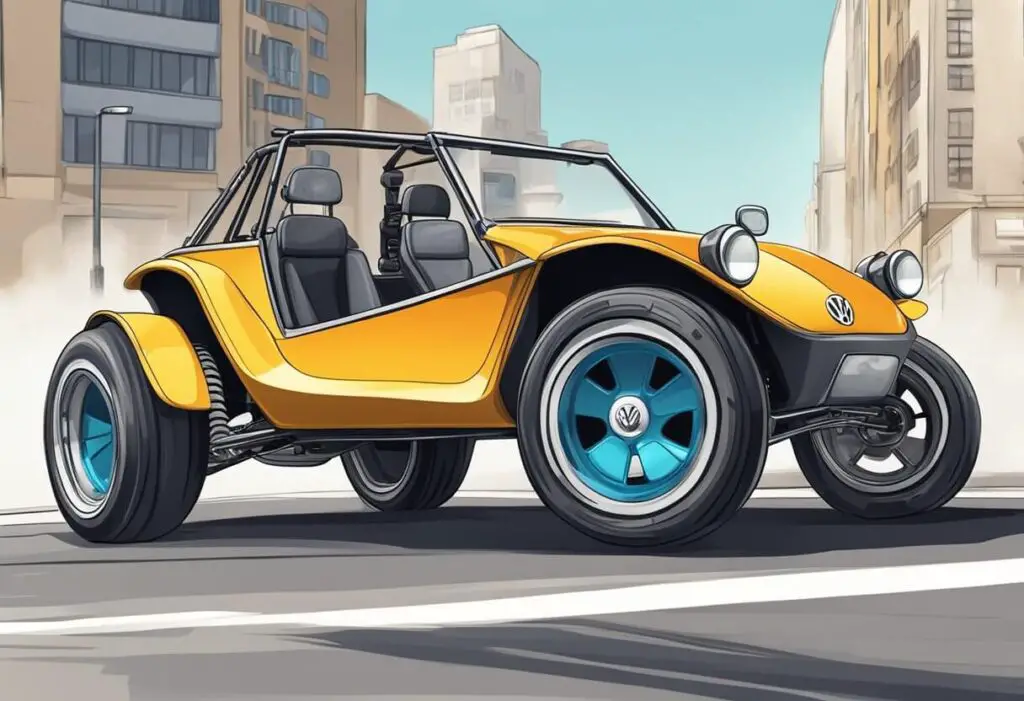
When it comes to converting a VW dune buggy into a street-legal vehicle, there are several modifications that need to be made to meet the legal requirements. Here are some of the key modifications that are necessary:
Lighting and Electrical Systems
One of the most important modifications that need to be made to a dune buggy is the lighting and electrical systems. Some of the key requirements for street-legal dune buggies include headlights, taillights, brake lights, turn signals, and a horn. Additionally, the electrical system needs to be properly grounded and protected to prevent any electrical hazards.
Braking System
Another important modification that needs to be made to a dune buggy is the braking system. Street-legal dune buggies need to have a braking system that meets the safety requirements set by the state. This includes having a working parking brake, a brake pedal that can stop the vehicle within a certain distance, and a properly functioning brake system that is free of leaks.
Tires and Wheels
The tires and wheels of a dune buggy also need to be modified to meet the legal requirements for street use. This includes having tires that are properly inflated and have adequate tread depth. Additionally, the wheels need to be properly aligned and balanced to ensure safe and stable operation on the road.
Inspection and Certification Process
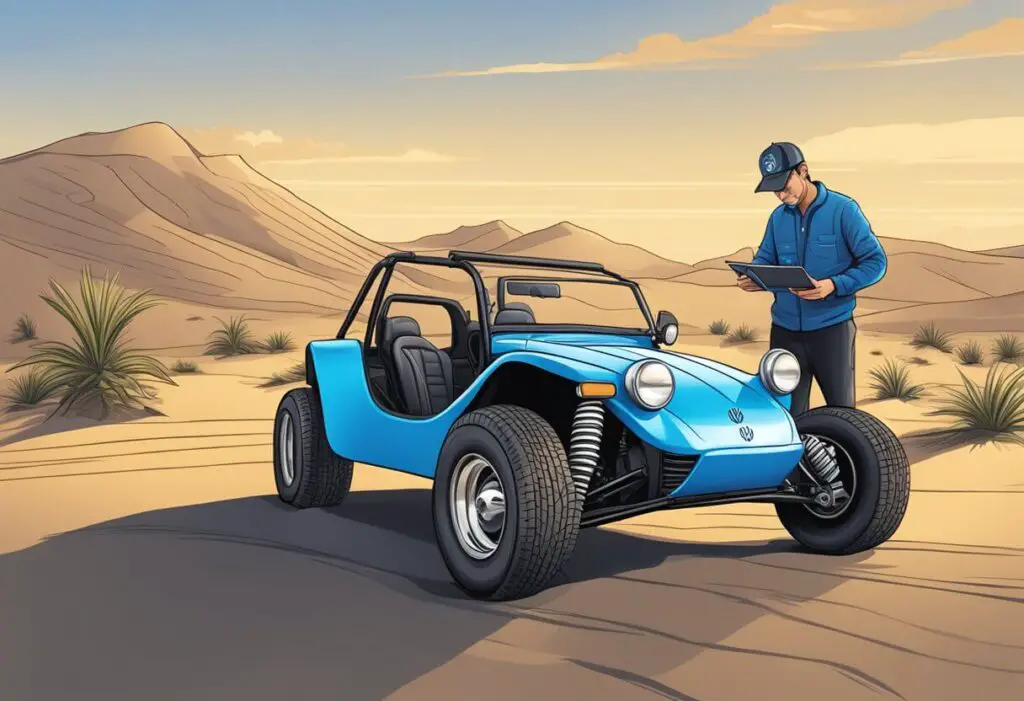
State-Specific Inspections
Before a street legal VW dune buggy can be driven on public roads, it must first pass a state-specific inspection. This inspection ensures that the vehicle meets all of the necessary safety and emissions standards set forth by the state in which it will be registered. The inspection process typically involves a thorough examination of the vehicle’s brakes, lights, tires, and other key components to ensure that they are in good working order.
State inspection requirements for registering a street legal VW dune buggy vary widely. Research the specific requirements for your state to ensure vehicle compliance.
Documentation and Proof of Compliance
In addition to passing a state-specific inspection, owners of street legal VW dune buggies must also provide documentation and proof of compliance with all applicable safety and emissions standards. This typically involves providing documentation of any modifications that have been made to the vehicle, as well as proof of compliance with all applicable emissions standards.
Owners may also be required to provide proof of insurance and registration, as well as other documentation as required by their state. It is important to keep all of these documents up to date and readily available in case of an inspection or other legal issue.
Insurance for VW Dune Buggies
When it comes to owning a street legal VW dune buggy, insurance is an important consideration. While it may be tempting to forgo insurance coverage, it is important to remember that accidents can happen, and having insurance can provide financial protection in the event of an incident.
Insurance Coverage Options
There are a few different types of insurance coverage options available for street legal VW dune buggies. Here are some of the most common options:
- Liability insurance: This type of insurance covers damages or injuries you may cause to other people or their property while driving your dune buggy.
- Collision insurance: This type of insurance covers damages to your dune buggy in the event of a collision with another vehicle or object.
- Comprehensive insurance: This type of insurance covers damages to your dune buggy from non-collision incidents, such as theft, vandalism, or natural disasters.
- Uninsured/underinsured motorist insurance: This type of insurance covers damages or injuries you may sustain in an accident caused by another driver who does not have enough insurance coverage.
Cost Factors
The cost of insurance for a street legal VW dune buggy can vary depending on several factors. Here are some of the most common factors that can affect the cost of insurance:
- Driving record: If you have a history of accidents or traffic violations, you may pay more for insurance.
- Location: Insurance rates can vary depending on where you live. If you live in an area with high rates of accidents or thefts, you may pay more for insurance.
- Age and gender: Younger drivers and male drivers may pay more for insurance.
- Type of coverage: The more coverage you have, the more you will pay for insurance.
- Deductible: The higher your deductible, the lower your insurance premium will be.
Owning a street legal VW dune buggy can be fun and exciting. Understand insurance coverage options and factors affecting cost to make an informed decision on the right type and amount of coverage.
Driving and Maintenance Tips
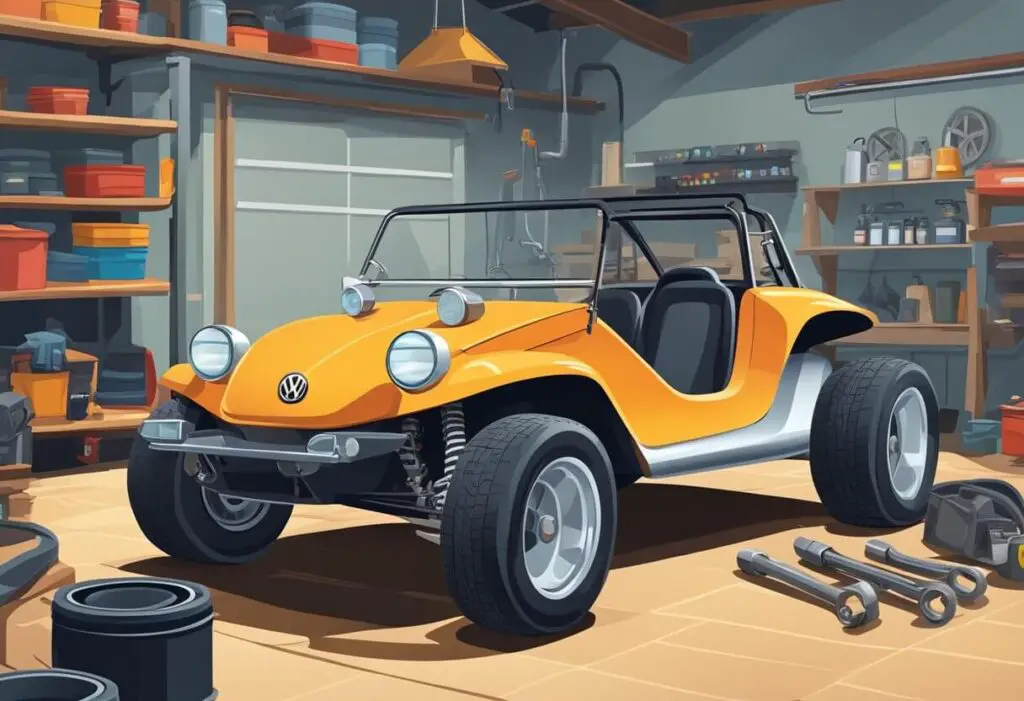
Driving on Public Roads
When driving a street legal VW dune buggy on public roads, it is important to follow all traffic laws and regulations. These vehicles are designed for off-road use, so they may not handle like a typical car on pavement. Drivers should take extra care when turning and braking, as well as pay attention to road conditions and other drivers. It is also important to ensure that the dune buggy is equipped with all necessary safety features, such as seat belts, lights, and mirrors.
Regular Maintenance Schedule
To keep a street legal VW dune buggy running smoothly, it is important to follow a regular maintenance schedule. This may include regular oil changes, tire rotations, and brake inspections. Drivers should also check the vehicle’s air filter and spark plugs regularly, and replace them as needed. It is important to use high-quality parts and fluids to ensure the vehicle’s longevity and performance.
In addition to regular maintenance, drivers should also inspect their dune buggy before each use. This may include checking the brakes, steering, and suspension, as well as ensuring that all lights and safety features are in working order. Drivers should also be aware of any warning signs or unusual noises, and address them promptly to prevent further damage.
Common Challenges and Solutions
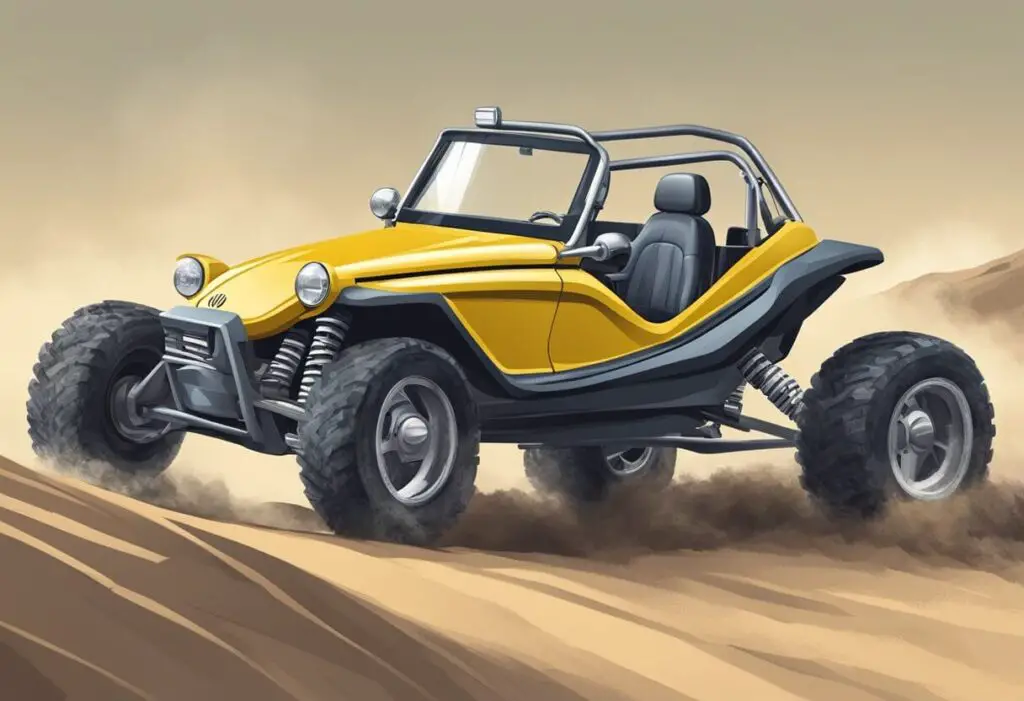
Finding Compatible Parts
One of the most common challenges faced by those looking to make a VW dune buggy street legal is finding compatible parts. Many dune buggies are built using Volkswagen Beetle parts, which can make finding the right parts a challenge. However, there are many companies that specialize in building and selling parts specifically for dune buggies. These companies can be a great resource for those looking to make their dune buggy street legal.
In addition to finding compatible parts, it is also important to ensure that the parts are installed correctly. This can be especially challenging for those who are not familiar with the mechanical aspects of their dune buggy. It is recommended to seek the assistance of a professional mechanic or dune buggy specialist to ensure that all parts are installed correctly.
Navigating Legal Variations by State
Another challenge faced by those looking to make a VW dune buggy street legal is navigating the legal variations by state. Each state has its own laws and regulations regarding street legal vehicles, and it is important to be aware of these laws before attempting to make a dune buggy street legal.
Some states may require additional safety features, such as seat belts or roll cages, while others may require emissions testing. It is important to research the laws in your state and ensure that your dune buggy meets all legal requirements before attempting to make it street legal.
Additionally, it is important to note that some states may not allow dune buggies to be driven on public roads at all. It is important to be aware of these restrictions and plan accordingly.

